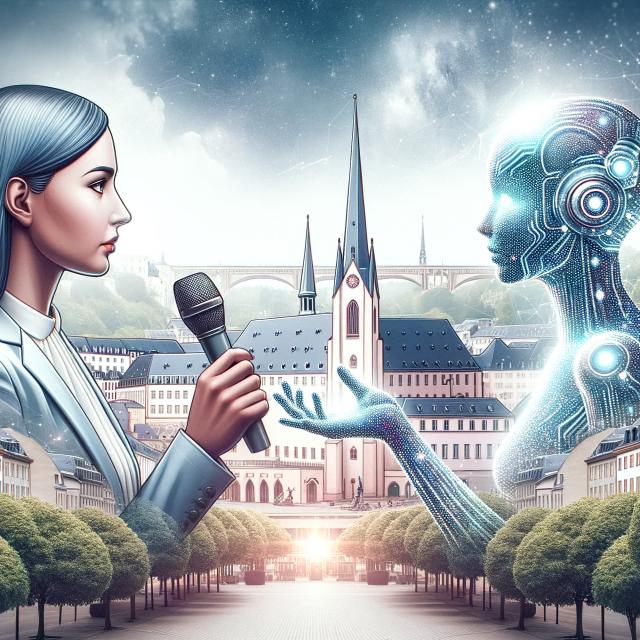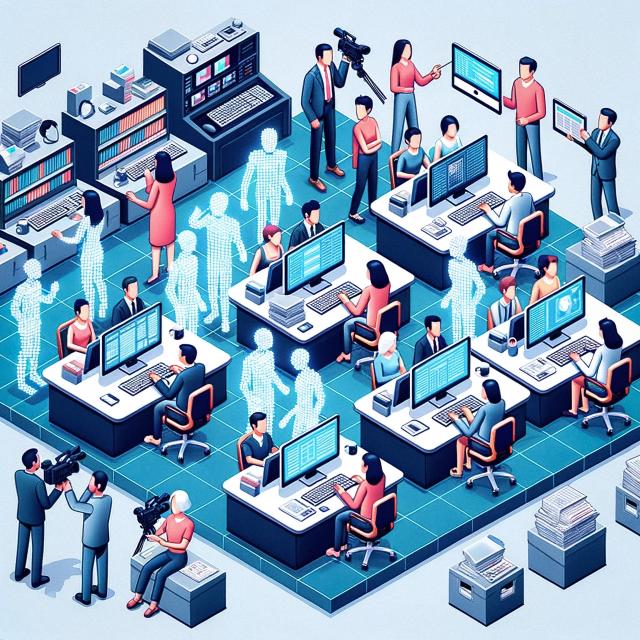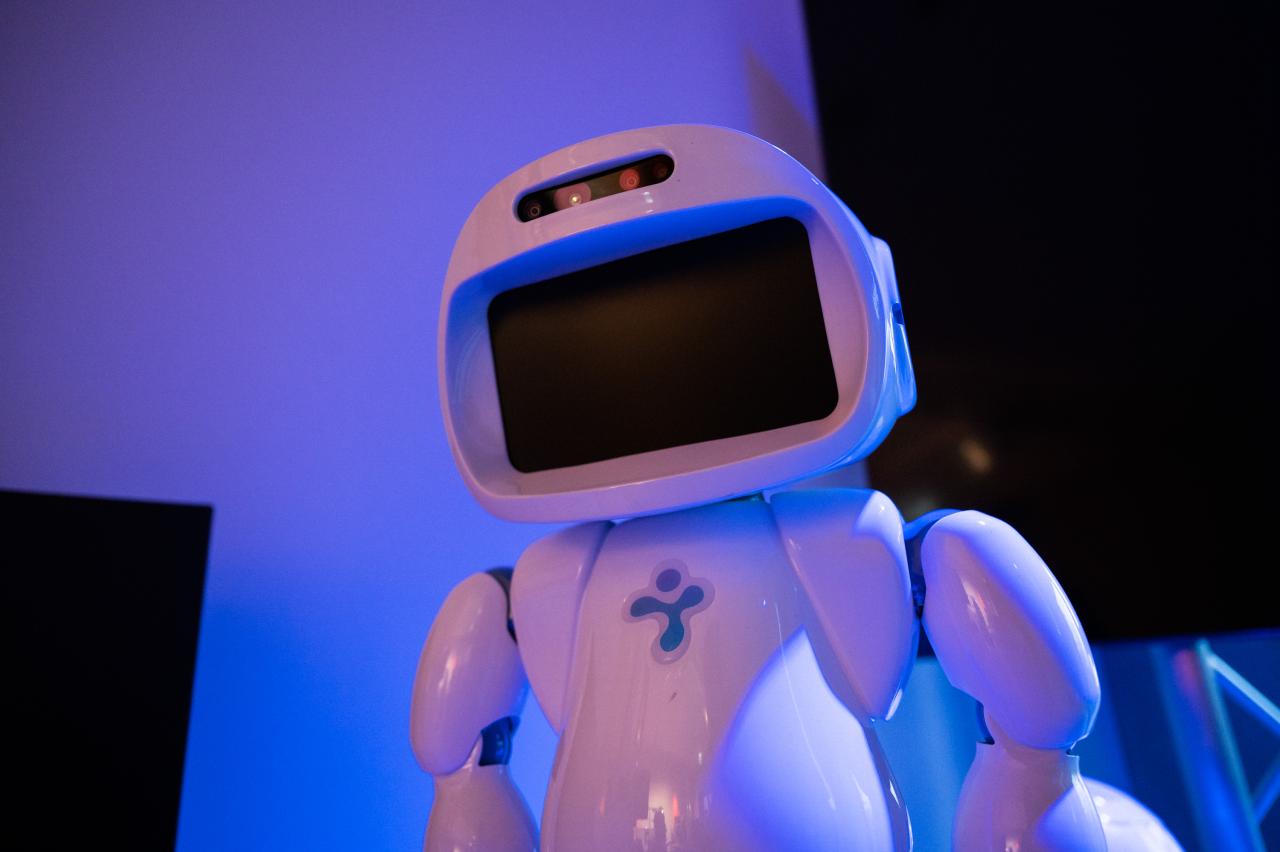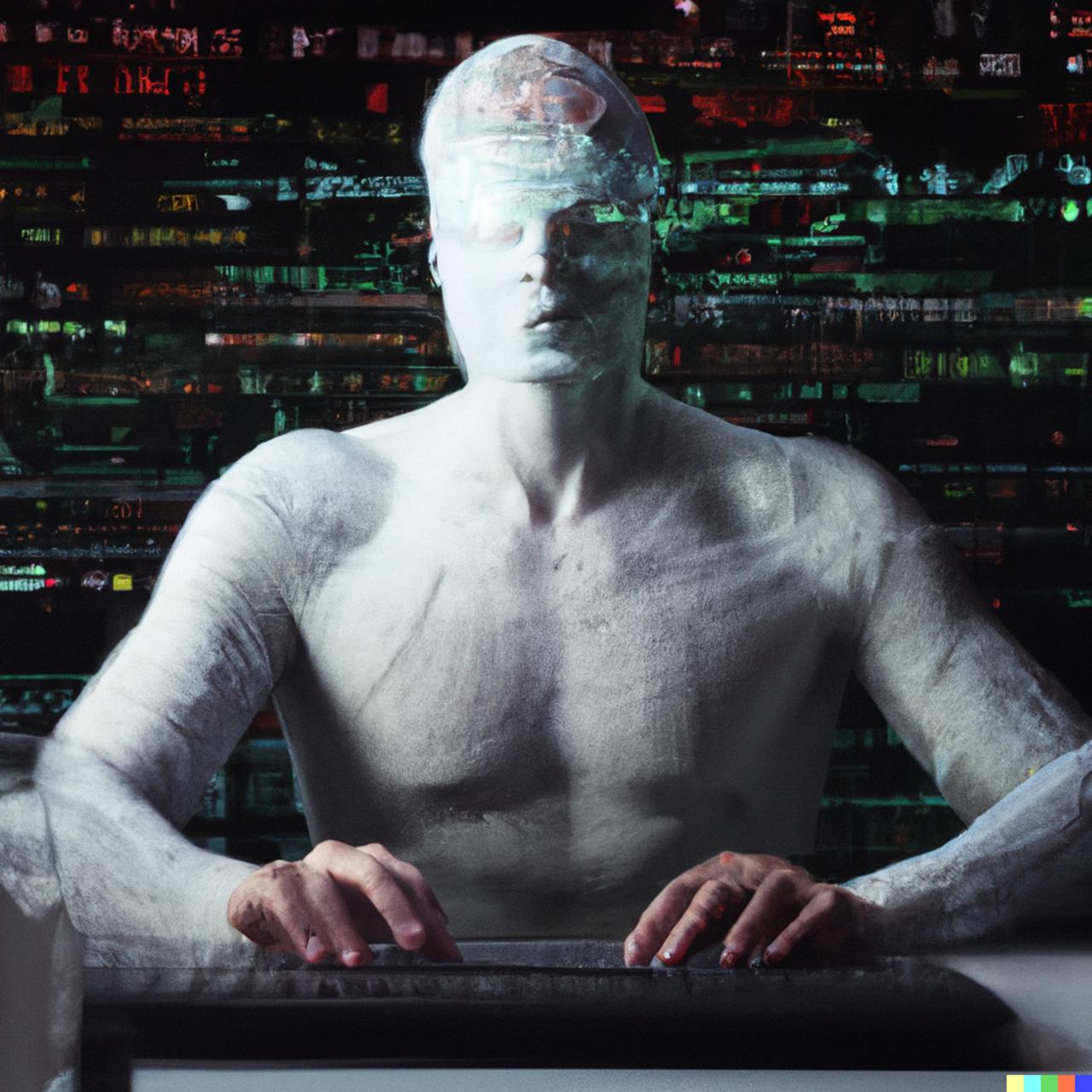
Listen to this article
Artificial intelligence both fascinates and causes concern. Industry specialists call for a global reflection on its role in our society, and our relationship with the media and democracy.
This article is provided to you free of charge. If you want to support our team and promote quality journalism, subscribe now.
The Reporters Without Borders international media ranking often reveals the good health of democracies, and vice versa. Independent media cannot exist in authoritarian regimes, which are keen to muzzle the press, which must then relay the regime's propaganda. So what role do technological tools such as AI play in this delicate balance? Originally created as a computational tool, artificial intelligence is now used to create voices, images and other content that look increasingly real, but are actually created by machines. A new way of working for journalists and politicians, with sources of information that are not always reliable and that the general public has to sort out. The issue is so complex that researchers from a wide range of disciplines are looking at it to start a conversation about the role of AI in our society.
Such is the case of the AI, media & democracy laboratory based in Amsterdam, which came into being two years ago. While technology is advancing much faster than our legislators, Europe wants to be at the forefront when it comes to regulating a kind of Far West that AI has become. "For what purposes do we want to use it and what are the needs, the points on which we need to be careful, for example, the factuality of this content that emerges from ChatGPT, etc.? The law, of course, hasn't caught up yet. I think the most important thing is to recognize that not everything is set in stone for the time being, that everything is developing at high speed and that people are already adopting these technologies", explains Sara Spaargaren, manager of the lab whom we interviewed by videoconference.
For her, it is imperative that research provides answers for a society that is at a loss when it comes to AI applications. This is particularly true for the media, who are increasingly working with speech-to-text tools (automatic voice recognition to transcribe audio interviews), translation or ChatGPT to generate formal e-mails, for example. But this is not without consequences: "When something goes wrong and the impact becomes significant, who takes responsibility? This is exactly the kind of question that media companies are trying to resolve at the moment. I think academia and knowledge institutions can be great interlocutors to step back and evaluate what we want, how we want to guide the use of these tools. That's what we're doing with the laboratory." Two of its researchers will shortly be sent to the BBC, so that they can work closely with journalists and understand the challenges facing the profession.

Sara Spaargaren
In just a few years, we've gone from article recommendations, to social networks that highlight certain content according to our preferences, to machine-generated content. An advance that raises a number of questions. For Dr. Maxime Amblard, professor of computer science at the University of Lorraine in Nancy, the first step is to define what AI is. "I think there's a problem at the outset, which is that today we call AI just about anything and everything. Computer science was introduced around the work of Alan Turing (British mathematician and cryptologist, author of works that scientifically founded computer science. He is also one of the pioneers of Artificial Intelligence, ed.), because he does something that is extremely difficult, but fundamental: mathematical calculation in the making. This is what provides the building blocks that will become computer science. Both theoretical and concrete, with the creation of programming languages. Algorithms are the part that is more concerned with design, organizing the calculations that are being carried out. These different building blocks form algorithms that are then implemented using a programming language. For Turing, the interesting thing is to know whether this calculation can simulate a human skill that humans are unable to calculate or perform, or because there is too much data to manage. And that's what he calls artificial intelligence."
Artificial intelligence as defined by Alan Turing is simply to make up for human incompetence, continues Prof. Amblard: "We have experienced a conceptual revolution, rather in the early 2000s when both the right theoretical mathematical tools appeared, and then the computational capacity. The data gathered from our own computers was also a determining factor. Today, when we talk about artificial intelligence, we tend to mix these two aspects. Theoretically, it's quite possible to do AI without learning on the one hand. And then, above all, we do a lot of computing that isn't AI at all."
The most famous AI tool is ChatGPT, which revolutionized all prediction tools of its kind. For Prof. Amblard, "it's a text generation tool that's really just a super mathematical probability model. It aggregates a lot of existing text data. It therefore feeds on a huge amount of data that is stolen or used without the consent of its authors. But the model that's built is just a model that predicts the next most likely word. And it generates the next most likely word so well that it forms sentences." Unlike humans, who "are meaning-making machines, because once the digital tool has produced a sentence, it's us humans who look at that sentence and say, 'ah what does that mean, or what did the machine mean with that?' But the machine, well, the model doesn't mean anything at all, it didn't mean to imply anything, there's no hidden message, there's just a word distribution model. That's what's really important: it has nothing to do with the truth. Because to tell the truth, you need to have knowledge of the world."
"You don't need more data to become smarter, you actually need more quality information to have a system that generates better content."
Maxime Amblard, professor of computer science at Université de Lorraine
As far as the researcher is concerned, current tools have no capacity to produce content that will make sense in its own right. For Sara Spaargaren, this reflection is particularly necessary for the media who might be tempted to use ChatGPT, for example. "If you look at how media is organized, where it's produced and how it's delivered, and the technologies that underpin it, there's generally a big divide within the media organization. And I think this is also the case in society in general. The technologies don't really address the end-user or the user of the tool. This makes it difficult to supervise technological design choices and their long-term impact."
For Maxime Amblard, the problem with ChatGPT from a media point of view is "how are we going to make sense of what has been produced? And that's where a human has to step in and editorialize what's been produced. That's the journalist's job, typically, to take the sentences and make sure that what has been generated builds an idea, a concept that makes sense in terms of truth and ethics. What's new is that we're now capable of generating false images, texts and videos. The human being is obliged to intervene to validate the discourse, to construct the discourse of reality. This is not the task of the tool", insists the researcher.
As far as he's concerned, the profession of journalist is not about to be replaced by machines. "When you look at ChatGPT 3.5 compared to ChatGPT 4, it does more things. ChatGPT 4 looks like it's more efficient, but if you ask it to solve simple reasoning tasks, in fact ChatGPT 3.5 is better than the last version." The researcher explains this by a misunderstanding of AI. "You don't need more data to become smarter, you actually need more quality information to have a system that generates better content. But we've reached a level where we've used so much poor-quality or synthetically generated data that we end up capturing a bit of the same thing over and over again. The mathematical nature that is used in these tools only mechanically amplifies what is expressed in the data." While advances in the field of AI are quite spectacular, we're still a long way from being overtaken by machines, relativizes the scientist: "I'm really not at all worried in the sense that I don't think AI is going to take over from humans. I think humans need to conceive of what AI is and that it's no more than tools."

Maxime Amblard
The bias of AI, and hence of the data it feeds on, is a problem that researchers are well aware of. In a previous article, we spoke to European Network Against Racism (ENAR) activist Oyidiya Oji, who came to Luxembourg to give a conference on the subject. At the time, she was astonished by applications for the general public that were based on biased data: "I started reading that in the USA, for example, driverless cars crashed or were more likely to crash into women, especially if they were women of color or people with some kind of disability, because the car can't see darker skin. In this case, since the engineers are often men, they figure, sure, it works. But it works for them." The professor also raises the question of AI bias. "In Europe, we also asked ourselves the question of how to build less biased models, and in fact, it's extremely difficult. So we haven't necessarily succeeded in an ultra-media way, but we're confronted with questions that are really difficult."
Raising media awareness
Awareness is therefore needed, not only for the industry, but also for the intermediary users that are the media. "It's obvious that this is shaking up organizations and professions, just as the issue of computer-assisted translation is shaking up the translator's profession", says Maxime Amblard, who distinguishes, for example, between machine translation tools for quick everyday use and quality translations that must always be supervised by competent people. The researcher is not worried about the disappearance of certain professions. If some tasks are going to be automated, that's a good thing in his view: "Repetitive tasks with no added value, if we can automate them and have tools capable of doing them, so much the better. That leaves a lot more time for the real work you know how to do as a politician or journalist, which for journalists is editorializing, and for politicians is constructing a way of thinking about the organization of society."
And to kick-start this discussion, Sara Spaargaren believes that the various players in society need to get around the table to target the real issues: "What we're trying to do here is organize discussion groups, conversations with the technical developers of an organization, but also with the editors who manage the management, because they're the ones who decide which tools can be used and what we can and can't do. So it's about bringing together different groups that can act as islands within an organization." For Dr Amblard, "there's an explicit and major sovereignty issue around artificial intelligence. We need people to develop, understand and analyze what is being done and what is possible with artificial intelligence, and at the same time, in terms of political, social and societal organization, we need to decide what we are doing. There's a risk of major polarization between players who master artificial intelligence and players who would be completely dependent on other operators."
"I think there will be laws that will at least ensure that platforms are more explicit about how they recommend information to people."
Sara Spaargaren, manager of the AI, media & democracy laboratory
Both specialists agree that the key message will lie in educating the general public to better apprehend these tools. While rumors and other forms of fake news have always existed, facilitated and mass production requires greater attention to everything we see and read. "I think there will be laws that will at least ensure that platforms are more explicit about how they recommend information to people. Another aspect is that it has to be more human-oriented. We always accept the cookie, we all say yes. And that's fine. But you really need to feel that you have a choice and that you're in charge of your information diet, so to speak. These kinds of questions are really important if we want to steer technology in a direction that really benefits diversity, " explains Sara Spaargaren. "The general public hasn't yet integrated that an image isn't reality. It's something that's going to take hold. Raymond Depardon and Capra are over. We're building a new relationship with information, in the sense of visual information, sound information and textual information. We're changing that relationship. We realize that 1 per cent of accounts on X (Twitter) produce 34 per cent of the information circulating. This means that the information circulating on Twitter doesn't reflect what people are expressing. The problem is that there's no one to deconstruct the discourse; they're left to believe that if they're seeing it in large quantities on Twitter, it's probably true. And when they try to find the expression of truth somewhere, it will give journalism or politics a very big meaning again, " explains Dr. Amblard.
While we wait for the general public and others to learn about the challenges posed by AI, experts are unanimous in saying that the AI Act will provide a welcome framework. "Europe is at the forefront of digital strategy. And not just an AI law, which will dictate how algorithms can and should be used, but also digital services laws, which regulate major platforms such as Facebook and Twitter. There's a whole set of regulations that are, on the whole, very innovative, and I don't think there are any elsewhere in the world, " believes Sara Spaargaren.

While some researchers and other tech specialists complain about regulations, Maxime Amblard is one of those who see regulation as a good way of taking a step back to make the right decisions about the use of these new technologies. "In Europe, we are hampered in the development of some of our research by legal issues. But this forces us to carry out ethical and deontological research. This may seem like a hindrance when you look at the level of advancement of what is being done in the United States, but we have a very good level of reflection on ethical and deontological issues. I certainly don't want to say that there's nothing in the United States, because I have plenty of colleagues working on this. They've been able to do all kinds of things without question, whereas we in Europe very quickly found ourselves prevented from collecting data and using it. We were forced to ask ourselves: what does it mean to take data without authorization? What does it mean to have models that amplify the biases that appear in the data? We get the impression that on the web, everyone is expressing themselves, when in fact this is far from being the case. It's still a lot of Westerners, a lot of men. As soon as you're racialized, as soon as you're a woman, the models have a lot of trouble."
Things are also moving forward in Amsterdam. "Recently, we organized a legal design workshop with civil society actors in the digital space called Algorithm Watch. We brought together experts from the field and academia to come up with suggestions for regulating general-purpose AI and generative AI in a way that allows Europe to preserve the responsible approach to AI that it has announced it will adopt. There are therefore a series of recommendations that policymakers can follow, and we are also ready to enter into dialogue with the organizations that have to implement the law."
While AI and its applications can be frightening, Maxime Amblard believes that it's not the tool itself that should be blamed. For the scientist, it's up to society to decide what it wants to do with it: "What I find interesting behind all these discussions and behind all the presentations I can make, is to convey the message that this is only the work of scientists. We produce tools and it's up to society to say whether these tools are acceptable or not, whether they should be integrated into its way of working or not. I don't have to judge them as a scientist, I can judge them as a citizen. And that's the difficulty. At the moment, people take artificial intelligence as something extraordinarily superior, which must be used because it exists. But without questioning for a second, what is it? What does it even do? Let alone what does it produce in society? And unfortunately for us scientists, that would be the right question, and I'd be delighted to see it addressed, but it's out of my hands as a scientist."
The illustrations in this article were generated by DALL.E 3 (Open AI)









